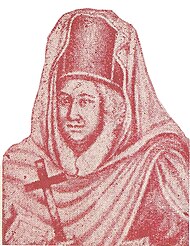 Constanzo Beschi, also known under his Tamil name of Vīramāmunivar (Tamil: வீரமாமுனிவர்) or Constantine Joseph Beschi
(in English) (8 November 1680 – 4 February 1747) was an Italian Jesuit
priest, Missionary in South India, and renowned poet in the Tamil
language.
Constanzo Beschi, also known under his Tamil name of Vīramāmunivar (Tamil: வீரமாமுனிவர்) or Constantine Joseph Beschi
(in English) (8 November 1680 – 4 February 1747) was an Italian Jesuit
priest, Missionary in South India, and renowned poet in the Tamil
language.Early years and formation
Born in Castiglione delle Stiviere, Mantova, Italy, a place very close to the family castle of Aloysius Gonzaga, Beschi got his secondary education in the Jesuit High School of Mantova. After becoming a Jesuit in 1698 he was trainedin Ravenna and Bologna from where he requested, and obtained, from Superior General Michelangelo Tamburini the permission to be sent to the Madurai mission in South India. Sailing from Lisbon he reached Goa in October 1710, from where he proceeded immediately to South India. He arrived in Madurai in May 1711.
In Tamil Nadu (Madurai Mission)
Beschi at Madurai Mission
Inculturation
Inspired by what was done in China Beschi adopted an Indian life style and introduced a touch of Hindu esthetics even in the Christian statuary. Similarly the churches he built (Poondi Matha Basilica at Poondi near Trichy, Periyanayagi maadha shrine at Konankuppam, and Adaikala maadha shrine at Elakurichi) in their architectonic lines, are inspired by Hindu temples. These churches are now Catholic pilgrim centers. There are two teak wooden cars built by him is still there in Kamanayakkanpatti which is another example for his Hindu inspiration. He made himself a sannyasi (Indian ascetic) and adopted their saffron coloured dress. His facility in making friendship, along with his cultural competence and obvious religious commitment gave him much influence which he used in order to protect Christians against exploitation and persecution. He is said to have baptized 12,000 people. He worked in the Thanjavur area till 1738 and settled in 1740 on the Coromandel coast where he remained till the end of his life. He died at Ambazhakad, Kerala, India.Master of Tamil literature
Even though he was primarily a missionary, he is also known, in a broader circle, as one of the classical writers of Tamil literature. Besides composing a literary Tamil grammar, he also wrote a grammar for the common use of Tamil – the first to do so – which earned him the title of Father of Tamil prose. He compiled several Tamil dictionaries: including the Chaturakarati (சதுரகராதி), the quadruple lexicon containing words, synonyms, categories of words, and rhymes; a Tamil-Latin and Latin-Tamil-Portuguese dictionary.His greatest poetical work is the Thembavani (தேம்பாவணி) (the Unfading Garland), an extraordinary epic poem – 3615 stanzas long – on Salvation history and the life of Saint Joseph. It is considered a classic of Tamil literature. He also wrote a prabandham (one of the minor literature) called Kavalur Kalambagam (காவலூர் கலம்பகம்), a grammatical treatise called Thonnool (தொன்னூல்), a guide book for catechists with the title Vedhiyar Ozukkam (வேதியர் ஒழுக்கம்), and Paramarthaguruvin kathai (பரமார்த்த குருவின் கதை), a satirical piece on a naive religious teacher and his equally obtuse disciples. In prose he left us polemical writings against the Lutheran missionaries and didactic religious books for the instruction of Catholics. He prepared a vademecum for newly arrived missionaries.

No comments:
Post a Comment